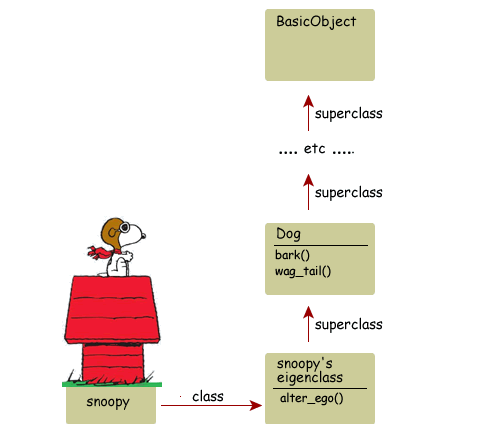Slides
Class Variables vs. Class Instance Variables
- Class Variables are accessed with
@@ Class Instance Variables are accessed with
@from inside a class methodClass Variables are available only via the class
Class Instance Variables are available from the class or any of its subclasses
rule of thumb: Class Instance Variables are cleaner, but Class Variables are easier to use
Class Methods
- a Class Method is an instance method of the eigenclass

Defining Class Methods
There are at least four idioms for defining Class Methods (i.e. switching contexts to the eigenclass of the class object and then defining a method there).
Number 2 is most common.
class Foo
# 1. pass the target to def
def Foo.a
end
# 2. pass the target to def, relying on the fact that self
# happens to be the class object right now
def self.b
end
# switch from class scope to singleton class scope
class << self
# 3. define a plain accessor in singleton class scope
def c
end
# 4. use a macro to define an accessor
attr_reader :d
end
end
(There are probably half a dozen more ways to do this, once you factor in class_eval and define_method and the like, but that should satisfy you for now. :-))
Class Instance Variable Scope
Remember: class methods access class instance variables.
class Foo
@a, @b, @c, @d = 1, 2, 3, 4
# 1. pass the target to def
def Foo.a
@a
end
# 2. pass the target to def, relying on the fact that self
# happens to be the class object right now
def self.b
@b
end
# switch from class scope to singleton class scope
class << self
# 3. define a plain accessor in singleton class scope
def c
@c
end
# 4. use a macro to define an accessor
attr_reader :d
end
end
p [Foo.a, Foo.b, Foo.c, Foo.d]
#=> [1, 2, 3, 4]
Class Instance Variable Gotcha
Remember: class instance variables are only available via the class they're defined on.
If you try to call any of those methods from (or via) a subclass, the methods will execute, but the @ variables will all be nil, since self will be the subclass's class object, not the parent class' class object.
class Bar < Foo
end
p [Bar.a, Bar.b, Bar.c, Bar.d]
#=> [nil, nil, nil, nil]